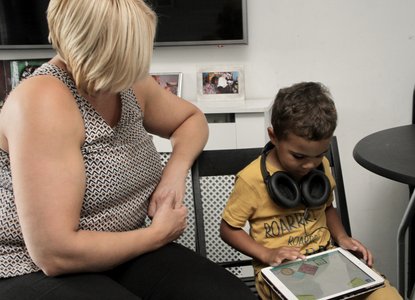Reading can make us laugh, cry, stir-up emotions to make us think differently or help us to walk in someone else’s shoes. Being able to read can help our children unlock the magic of books and develop a lifelong love of reading. Nurturing reading skills is important to set the foundations for a child's early language, thinking and writing ability. That’s why we're working hard, with the help of our partner Chase, to develop a love of reading through the Chase Rewarding Futures school libraries programme. Find out more about Chase’s commitment to improving childhood literacy skills.
Top tips for reading with your little ones
While you can’t force a love of reading, reading for fun is something you can nurture and encourage. One of the most effective ways to do this is by making time to read together. These video clips have been put together to support you and your child in sharing in some book love at home or wherever you find the time and space to get comfortable with a good story.
Sharing in the book love - reading with your child
Reading a book offers so many benefits for children and adults alike. It can make us laugh, it can thrill us and it can even make us cry. Reading can help us find out more about the world and connect our lives with the lives of others. But what about reading for pleasure? Why does reading for pleasure really matter? Watch our video which explains why reading for pleasure is so important and find some top tips on how to encourage a love of books with your child.
Bringing stories to life - reading aloud to your child
Discover how to bring stories to life and learn tips on how to get the most out of reading aloud to your child. Martin from the National Literacy Trust has six helpful tips to get you started.
In this video, Martin mentions some useful websites to have a look at when you have a moment to help you in your reading for pleasure journey with your child:
- Check out award-winning author Mem Fox’s read aloud commandments.
- Borrowbox is a great way to access free online and audiobooks from your public library.
Let's get chatty - talking about books with your child
Let's talk about books! Join Lucy from the National Literacy Trust as she shares tips on how to inject more fun and enjoyment into your child's reading experience. Lucy explains why 'booktalk' matters and four great ways to get started.
In this video, Lucy mentions some useful websites which will help you in your reading for pleasure journey:
- Lovemybooks.co.uk offers a great selection of titles for all ages, together with suggested activities for book-based fun.
- Empathy Lab provide expertly curated lists, focused on titles that offer the chance to explore a vast range of social situations filled with well-drawn characters.
We're going on a book hunt - finding the right book
Watch our next video to explore ways to support your child on their reading for pleasure journey. Martin from the National Literacy Trust shares top tips on how to find the right book for your child.
You can find our list of recommended websites and additional information: National Literacy Trust guide to finding recommended reads.
Building on the love of books - Follow-up activities based on reading
It’s time to build on the love of books by going beyond the books. Discover some creative ways for you and your child to get the most out of reading.
Discover ways to go beyond the book with our list of recommended websites to help you put the fun back in reading.
Make it memorable – the importance of empathy
In the final part of our series of videos exploring the power and importance of reading for pleasure, let's look at how reading can help build empathy.
Why reading for fun matters
Our research shows that reading for pleasure plays a very important role in developing keen, confident readers. Let's show you why it's important:
- Children who enjoy reading are three times more likely to read above the level expected for their age (National Literacy Trust, 2019)
- Children who read for enjoyment generally make more progress in both maths and vocabulary and spelling between the ages of 10 and 16 than those who rarely read (IoE, 2013)
- Reading for fun can result in increased empathy, improved relationships with others, better parent-child communication (The Reading Agency, 2015)
- Reading for enjoyment is more important for children’s cognitive development between ages 10 and 16 than their parents’ level of education (IoE, 2013)
Sound good? We think so. Never underestimate the powerful contribution you can make by putting the fun back into reading. Enjoy making precious reading memories together.


